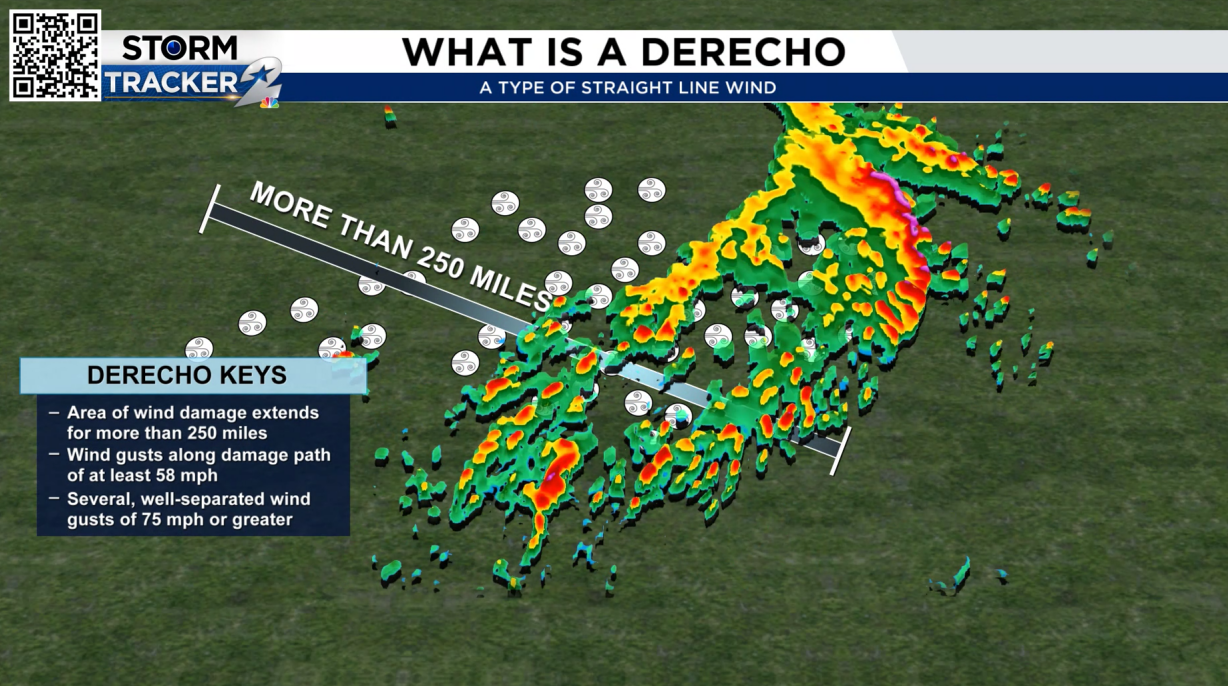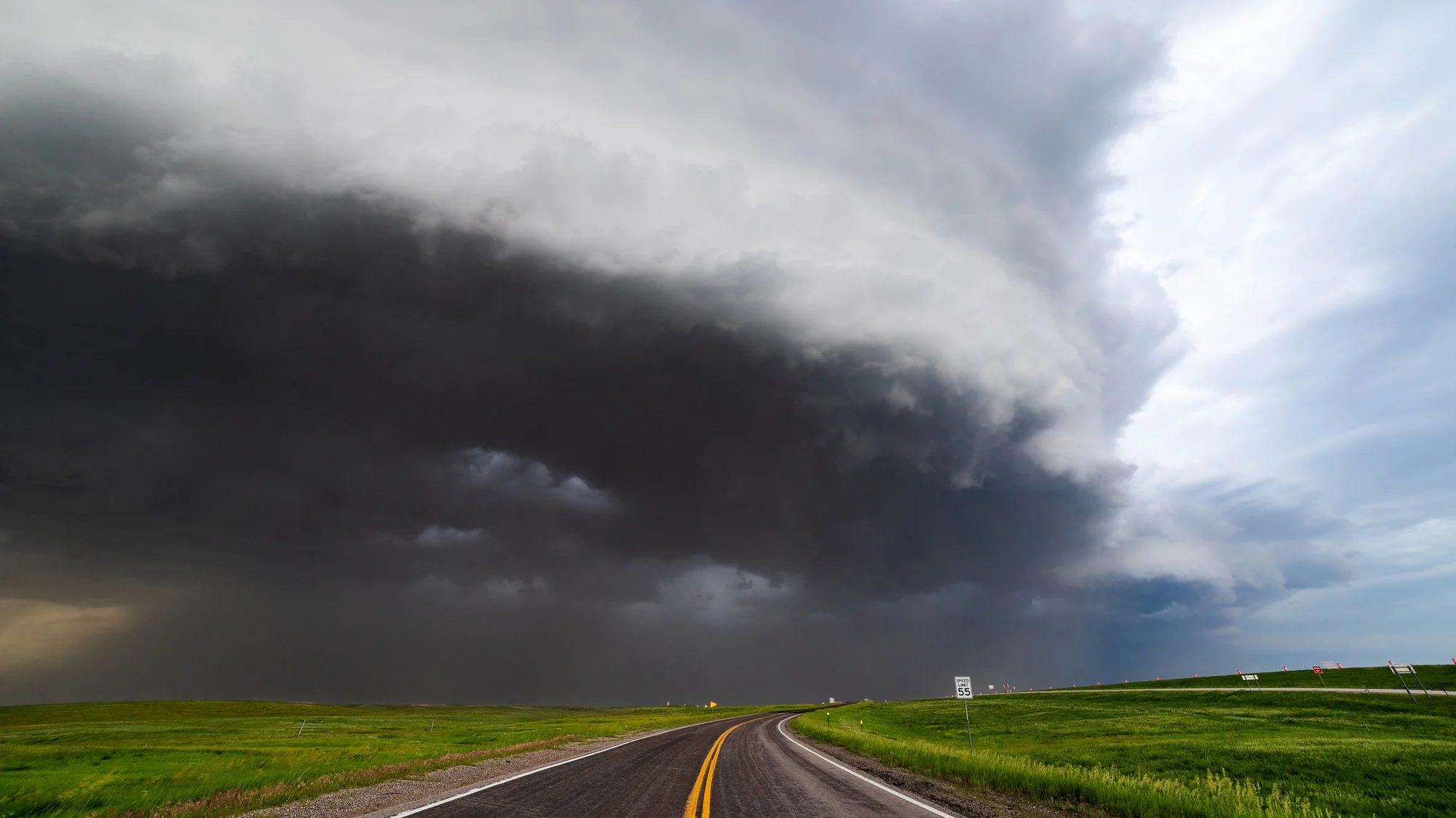
What Is a Derecho?
A derecho is a large, fast-moving line of severe thunderstorms that produces widespread, long-lasting wind damage. Unlike tornadoes, which are concentrated in smaller areas, derechos cover a much broader region, often affecting multiple states as they travel. The word “derecho” is Spanish for “straight,” which reflects the straight-line winds these storms produce, as opposed to the rotating winds of tornadoes.
To qualify as a derecho, the storm system must generate wind gusts of at least 58 mph (93 km/h) over an area of 250 miles or more, with pockets of wind damage along its path. These storms can cause downed trees, power outages, and extensive property damage similar to what you’d expect from a tornado.
How Do Derechos Form?
Derechos form when clusters of thunderstorms organize into a long, continuous line, known as a “squall line.” These lines develop in environments with warm, moist air near the surface and cooler, dry air aloft. When the two air masses meet, the resulting instability fuels powerful thunderstorms that produce strong, straight-line winds.
As the line of storms moves forward, it accelerates, and the winds at the leading edge can reach hurricane-force speeds. In addition to the damaging winds, derechos often bring heavy rain, frequent lightning, and large hail, further increasing the potential for widespread damage.
Key Ingredients for a Derecho:
- Warm, moist air near the surface to fuel thunderstorm development.
- Cooler, dry air aloft to create instability and wind shear.
- A strong jet stream to help organize and sustain the squall line.
What Makes Derechos So Dangerous?
Derechos are dangerous because of their high winds and the vast areas they affect. While a tornado might destroy one small neighborhood, a derecho can damage entire cities or multiple states. These storms are particularly hazardous because they often develop and spread rapidly, giving people little time to prepare.
1. Widespread Wind Damage
The most notable feature of a derecho is its destructive wind. Wind speeds in a derecho can exceed 100 mph (160 km/h), which is similar to a Category 2 hurricane. These straight-line winds can down trees, damage homes, and disrupt power for days or even weeks.
2. Flash Flooding
In addition to the wind, derechos often bring heavy rainfall that can lead to flash flooding. The rapid rainfall can overwhelm drainage systems, flood roads, and damage homes and businesses. Flooding during a derecho is particularly dangerous because it can occur alongside damaging winds, limiting evacuation options.
3. Power Outages
Because derechos can travel hundreds of miles, they often cause widespread power outages by downing power lines and damaging electrical infrastructure. During the August 2020 derecho that swept across the Midwest, over 1 million people lost power. Power outages lasting several days are not uncommon after a derecho, leaving people without essential services in extreme heat or cold.
Famous Derechos in History

While derechos are relatively rare, they have caused some of the most significant wind damage events in U.S. history. Here are a few of the most famous derechos:
1. The “Super Derecho” of 2012
In June 2012, a massive derecho traveled from the Midwest to the East Coast, covering over 700 miles in just 12 hours. The storm caused widespread wind damage, left millions without power, and resulted in 22 fatalities.
2. The August 2020 Midwest Derecho
One of the most destructive derechos in recent history, the August 2020 Midwest Derecho, impacted states like Iowa, Illinois, and Indiana. Wind speeds exceeded 100 mph, causing over $7.5 billion in damage, downing millions of trees, and leaving hundreds of thousands without power for days.
3. The “New York Derecho” of 1995
This powerful derecho swept across the Northeast in July 1995, causing widespread damage in New York City and surrounding areas. Wind speeds reached 70 mph, and 3.5 million people were left without power as trees and power lines came down across the city.
How to Stay Safe During a Derecho
Because derechos move quickly and can cause extensive damage, it’s crucial to be prepared before one strikes. Here are some expert safety tips to help you protect your home and family:
1. Know the Forecast
Stay informed about severe weather forecasts, especially during the summer months when derechos are most common. The National Weather Service will issue severe thunderstorm watches or warnings if conditions are favorable for a derecho. Keep an eye on the weather, and be ready to take action if a storm is headed your way.
2. Secure Outdoor Items
Before the storm arrives, secure any outdoor furniture, grills, or other loose items that could become projectiles in high winds. Bringing these items indoors or securing them can prevent them from causing further damage.
3. Take Shelter Indoors
When a derecho is approaching, the safest place to be is indoors. Move to an interior room, away from windows, to protect yourself from flying debris. If you’re driving, pull over and wait for the storm to pass, avoiding trees and power lines.
4. Prepare for Power Outages
Because derechos often cause widespread power outages, it’s essential to be prepared. Have flashlights, extra batteries, and a backup power source ready. If you rely on medical equipment that requires electricity, consider having a generator or other backup power options in place.
FAQ
| Question | Answer |
|---|---|
| What is the difference between a derecho and a tornado? | A derecho produces straight-line winds over a wide area, while a tornado produces rotating winds that impact a smaller area. Derechos can cover hundreds of miles, causing widespread damage. |
| How fast do the winds in a derecho travel? | Winds in a derecho can exceed 100 mph, similar to the wind speeds of a Category 2 hurricane. |
| How long do derechos last? | Derechos can last for several hours and often travel hundreds of miles. The 2020 Midwest Derecho traveled 770 miles in just 14 hours. |
| What time of year are derechos most common? | Derechos are most common in the late spring and summer months, when the weather conditions necessary for their formation are more likely to occur. |
| Can derechos cause flooding? | Yes, derechos can cause flash flooding due to the heavy rain they often bring. This, combined with strong winds, can make them particularly dangerous. |
If your home has suffered damage from a derecho or other severe storm, contact Citywide Mold Mitigation for expert storm damage restoration services.

